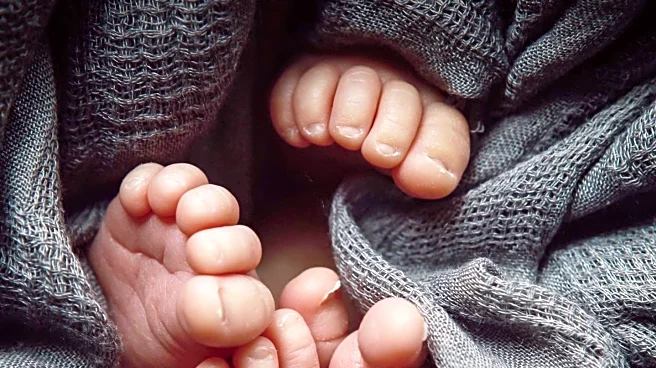What's Happening?
A bioacoustics researcher has conducted extensive studies on the cries of human babies, challenging traditional beliefs about parental intuition in understanding these cries. The research involved analyzing the acoustic properties of babies' cries using machine learning algorithms and human listeners, revealing that cries do not reliably indicate specific needs such as hunger or discomfort. Instead, cries convey static information about the baby's vocal identity and dynamic information about the level of distress. The study found that the ability to decode cries is learned through exposure rather than being an innate maternal instinct, with fathers performing equally well as mothers when they spend similar amounts of time with their infants.
Why It's Important?
This research has significant implications for parenting and childcare, as it dispels the myth of maternal instinct and emphasizes the importance of learned experience in understanding babies' cries. It highlights the role of cooperation in caregiving, suggesting that any dedicated caregiver can become adept at interpreting cries through practice. This understanding can alleviate parental stress and guilt associated with deciphering cries, promoting a more collaborative approach to childcare. Additionally, the findings can inform the development of more effective support systems for parents, reducing the risk of stress-related issues such as shaken baby syndrome.
What's Next?
The research suggests a shift in focus from trying to decode cries to understanding the context and level of distress, encouraging parents to rely on their knowledge of the situation rather than attempting to interpret cries as specific signals. This approach can lead to more effective caregiving strategies and support networks, allowing parents to share responsibilities and seek help when needed. Future studies may explore further applications of these findings in developing tools and resources to assist parents in managing the challenges of infant care.
Beyond the Headlines
The study challenges cultural norms surrounding parenting and the perceived role of mothers, advocating for a more inclusive understanding of caregiving that recognizes the contributions of all caregivers. It underscores the importance of empathy and experience in shaping the brain's response to cries, suggesting that caregiving skills can be developed by anyone, regardless of gender. This perspective can influence societal attitudes towards parenting, promoting a more equitable distribution of caregiving responsibilities.










